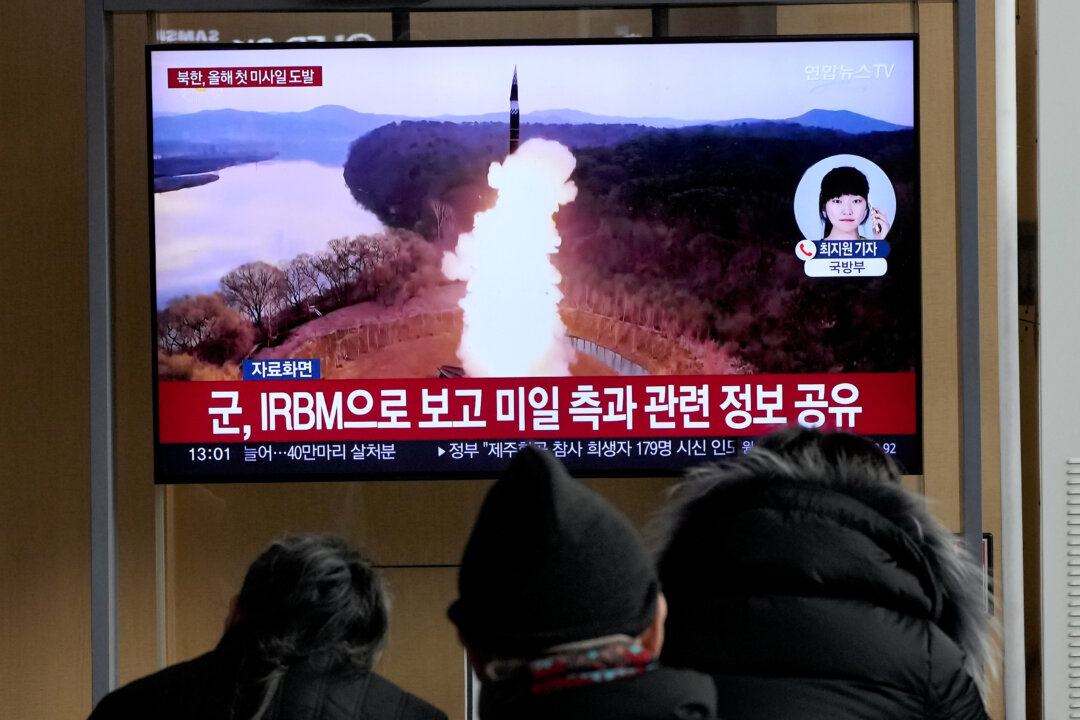Outgoing secretary of state, Antony Blinken, condemned the North Korean missile launch, which violates U.N. Security Council resolutions.
South Korea’s military claims North Korea fired a ballistic missile into waters north of Japan on Jan. 6, resuming its weapons testing program just two weeks before President-elect Donald Trump is inaugurated as president.
The joint chiefs of staff of South Korea said the missile was fired in an easterly direction and traveled 685 miles before ending up in the Sea of Japan.
The missile launch was Pyongyang’s first since Nov. 5, when it fired seven short-range ballistic missiles off its east coast.
The latest launch coincided with outgoing Secretary of State Antony Blinken’s visit to Seoul for talks on Jan. 6.
Blinken’s visit comes at a time when South Korea is mired in political turmoil, with President Yoon Suk Yeol having been impeached over his decision to impose martial law on Dec. 3, blaming “anti-state forces.”
Yeol reversed the decision six hours later but is being investigated over charges of rebellion.
In a news conference on Jan. 6, Blinken condemned North Korea for the missile launch, which violates U.N. Security Council resolutions.
The South Korean joint chiefs of staff said the missile launch posed a threat to peace and stability on the peninsula, which has been divided along the 38th parallel since 1953.
The Japanese Defense Ministry said the missile landed outside its exclusive economic zone, and there were no reports of damage to Japanese vessels.
Japanese Prime Minister Shigeru Ishiba said he was concerned about North Korea apparently accelerating the pace of its missile tests.
Last year, Pyongyang tested a number of nuclear-capable missile systems that pose a threat to South Korea, Japan, and conceivably the United States, including a new intercontinental ballistic missile which broke records for both altitude and flying time.During a political conference at the end of last month, Kim promised North Korea would implement the “toughest” ever anti-U.S. policy, and described the U.S.-South Korea-Japan alliance as a “nuclear military bloc for aggression.”
His comments echoed the hawkish tone Russian President Vladimir Putin has offered toward the United States and NATO since his country’s military invaded Ukraine in February 2022.
During his first administration, Trump met Kim three times for talks on North Korea’s nuclear program.
During the Jan. 6 news conference, Blinken, who was accompanied by South Korean Foreign Minister Cho Tae-yul, warned of the danger of the axis between Moscow and Pyongyang.
North Korea has supplied the Kremlin with large numbers of artillery shells for its war with Ukraine, and last month the Pentagon confirmed Kim Jong Un had sent troops to the front to fight alongside Russian forces.
Last week Ukrainian President Volodymyr Zelenskyy claimed the North Koreans had suffered 3,000 casualties in the fighting so far.
Blinken said the military cooperation between Russia and North Korea was a “two-way street,” claiming Moscow was giving North Korea training on missiles and “intends to share space and satellite technology.”
Blinken and Cho denied the political crisis in South Korea would affect the relationship between Washington and Seoul.

The secretary of state—due to be replaced by Trump’s pick, Sen. Marco Rubio (R-Fla.) later this month—said, “We had serious concerns about some of the actions that President Yoon took and we communicated those directly to the government.”
“At the same time we have tremendous confidence in the resilience of South Korea’s democracy, in the strength of its institutions and in the efforts that it’s making to work through those institutions, pursuant to the constitution and the rule of law to resolve differences and to do so peacefully,” Blinken said.
During his first term, Trump complained about the cost of keeping 28,000 U.S. troops in South Korea as a deterrent to the communist North, and demanded a greater financial contribution from Seoul.
The Associated Press and Reuters contributed to this report.

